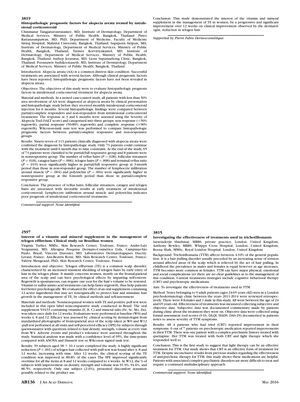Histopathologic Prognostic Factors for Alopecia Areata Treated by Intralesional Corticosteroid
April 2016
in “
Journal of The American Academy of Dermatology
”

TLDR Certain scalp tissue features can predict how well alopecia areata responds to steroid injections.
The study from 2016 investigated histopathologic factors that could predict the response to intralesional corticosteroid treatment in patients with alopecia areata (AA). Out of 113 patients clinically diagnosed with AA, 97 were confirmed by histopathologic study, and 73 continued treatment for 6 months. The results showed that the presence of vellus hairs, follicular streamers, catagen hairs, telogen hairs, and a higher terminal:vellus hair ratio at the 3-month period were significantly associated with a better response to treatment. Conversely, higher levels of lymphocyte infiltration around muscle and polytrichia at the 6-month period were associated with a poor response. The study concluded that certain histopathologic features can serve as prognostic factors for the effectiveness of intralesional corticosteroid treatment in AA.
